updated picture: The 6 year old pianist is now 8 years old. November 2012.
 Using the 真善美 Truth, Goodness and Beauty of piano
Using the 真善美 Truth, Goodness and Beauty of piano
Truth 真
- 0% negativity. I make a personal vow to myself at the beginning of the piano journey to not use threats, negativity, etc to push my child towards “excellence”. Excellence is a by-product of regular hardwork and love. Instead, I focus on pairing my child’s time on the piano with her sense of meaning, success and joy.
- of course, that is easier said than done. When I get busy with my own life, I forget to practice with my child, and then I would rush her to practice before her lesson day. (Imagine a basketball player who does not practice until 2 hours before the basketball competition! How effective that would be?) In order to avoid this, I keep a journal. I write down day 1 on the first day that I do not use stress, negative pressure on my child to practice. I write day 2, 3, 4, etc until day 21. When I get to day 21 of not using any negativity with my child’s piano practice, it would have become a habit by day 21.
- I have to constantly remind myself not to pollute my child’s mind with my own frustrations/anxieties. E.g. Instead of parent lamenting aloud “Why don’t you practice more?” (Structure the day so she has enough fun, play, rest, food, sleep and after that, time to practice without distractions of TV or other attractions), or “Such and such peer/friend is better than you” instead: structure the day, so she has enough fun, play, rest, food, sleep, and after that, solid time to practice without distraction (same solutions!) The more I pollute her days with negative statements, the more my child will associate playing piano with hatred and stress. Instead, I empower my child by creating the structured space and time for her to practice with joy.
- Without using bribes, pressure, threats, I will have to surround myself with other creative means to motivate my little pianist.
- click here to view entries of “Our Piano Practice Diary“.
- Living Pictures
- Biographical living pictures. I tell my child a very simple “fairy tale” picture specifically about her and her relationship with piano based on true facts and early life events for my child only. My child thrives on such loving stories.
- Family photo album with composers.
- Click to see this super easy craft tutorial
- print out color paintings of composers you want your child to identify with or composer whose pieces your child is playing
- cut out a la scrap book and paste pictures of the composes surrounding a photo of your child happily playing piano.
- Each composer’s name is labeled, including your child’s name.
- This is a strong image of the composer surrounding the child and giving their guidance and blessings to your child’s musical learning journey.
The little pianist surrounded by color print outs of her “family” of classical composers who will guide the little one’s piano journey.
- Piano stories
- Franz Lizst, Beethoven, the Schumans, etc
- as my child is still very young, I shun the hypochondriac or more tragic tales of composers, as not to have my child identify genius with angst.
- Walking the journey together. When my child sees that I value piano, she will value it herself.
- A music rich environment. CD’s, stories, books, ballet, theater etc.
- my husband had said: if we move back to Europe, the artistic, cultural, musical environment would be rich and naturally our children would pick up music easily. True. So, while waiting for that day, we have other resources to create a musically rich environment.
- Mini concerts at home
- list of CD’s we love
- Reduce or no TV. The time spent passively being entertained by the media, can be more useful for a child to be engaged. Additionally, a child who watches TV needs time to digest their viewing (thus spaces out) and need time to recover to pay good quality attention to piano practice. Additionally, boredom is an excellent tool for a child to learn to be creative! When my child is bored, she learns to make crafts, art, be resourceful to entertain herself. I always schedule “boredom time” after meals (no TV, no other arousing attractions but an open piano in a bare room) where the family migrates to the piano, so that piano practice will be the natural solution to break that boredom.
- Strong rhythms everyday
- set up the same routine daily for piano. When the child has been fed, has (or will have) physical exercise, social play, rested, had down time from school, fun time, etc in the course of the day. When their basic needs are met on a daily basis, they are happy to enjoy time at the piano.
- When practice becomes a habit, (just like brushing your teeth everyday) there is no need to nag or push, the child comes to expect this as a regular part of the day. E.g. after her 3pm snack time, it’s 1 hour piano practice time, the child naturally senses that “this is what we do in our home”.
I do think, the mother/parent’s role is of utmost importance in ensuring the continuation of a child’s piano practice. One cannot blame a 6 year for not practicing, or for procrastinating. A 6 year old does not have the same control over her daily routines and activities as the parent does. The mother’s role is to create the space for love and practice of this craft for the child, in her/his everyday life.

Translation:
Sucess does not belong to the one who runs the fastest.
It belongs to the one who continues running.
Being the best is not the result of wrestling it from a competitor.
Being the best is the result of gradual and continual building.
Goodness 善
- Constantly building the appetite for learning and loving piano
- making sure to pair piano time with joyful memories and stay away from negativity
- telling the child inspiring stories
- reminding the child that she too, can be giving something special to the world
- Give a child a sense of ownership of her labors.
- So that she is not “playing piano for the sake of mother” or to “impress” anyone, but that this is something she works at and owns herself.
- Practical use for piano music for a 6 year old
- piano accompaniment for an upcoming puppet show for her birthday:
- We are practicing our piano pieces so my 6 year old can use them in scenes for her November 2011 7th birthday party Puppet Theatre: Snow White and Rose Red. We are currently handmaking the dolls and practicing the music for it. Much excitement!
- soothing an older sibling with autism
- piano accompaniment for an upcoming puppet show for her birthday:
- Imagining dramatic scenarios
- When we are learning a difficult piece or when the child’s motivation is wanting, pictures of dramatic scenarios are helpful in fueling the child’s engine for more work…
- “Imagine one day you are at your ballet class and the CD player broke down. Ms Marci throws her hands up in the air and says “Well, we will all have to go home now, since there is no music to dance to”. However, you peek at the corner of your eye, a dusty old piano in the corner of the room. “Oh! If only someone can play piano, we could stay and practice ballet a little more. Can anyone here play Bourree by Leopold Mozart (or fill in the blank with whichever piece you are practicing), well, can you play some Bouree for your friends?” This type of motivation is useful for my child who loves to be helpful. Also, the ballerinos and ballerinas need to practice their plies more many sets of repeats…so, my little pianist will have to make repetitions of certain musical phrases.
- you can also substitute that story with “Church without a pianist”, “school play”, “classroom needing music”, “talking to an orphan child/puppy in the rain who cannot understand language but only piano music”, etc
- When we are learning a difficult piece or when the child’s motivation is wanting, pictures of dramatic scenarios are helpful in fueling the child’s engine for more work…
- Love and reverence for teacher
- Back home, as I was growing up, we used to say, “if you hate a teacher, you will do poorly in that subject”. My parents were sure that we treated teachers, books, educational material with a sense of reverence.
- child-made knitted scarf for piano teacher for Christmas
- fresh flowers from our garden for teacher
- blueberry muffins made by child for teacher
- As the child loves the teacher and treats the lesson with reverence, she looks forward to meeting the teacher and lesson and takes responsibility and pride her learning journey.
- Back home, as I was growing up, we used to say, “if you hate a teacher, you will do poorly in that subject”. My parents were sure that we treated teachers, books, educational material with a sense of reverence.
- Puppet shows.
- In summer of 2011 Nunu, her fellow piano student Anichka and I prepared a puppet show for Nunu’s 7th birthday in November 2011. We made the dolls and props, the girls practiced their piano pieces over the months. I paid my little pianists $20 each to perform in front of a crowd of 30-40 children and their parents on Nunu’s 7th birthday. This was motivation for the children’s practice: To give the gift of music to their friends. When playing piano has a practical use, it helps the children focus on the practice. Click on the picture below to view the 2011 puppet show.
Homemade puppet show for Nunu’s 7th birthday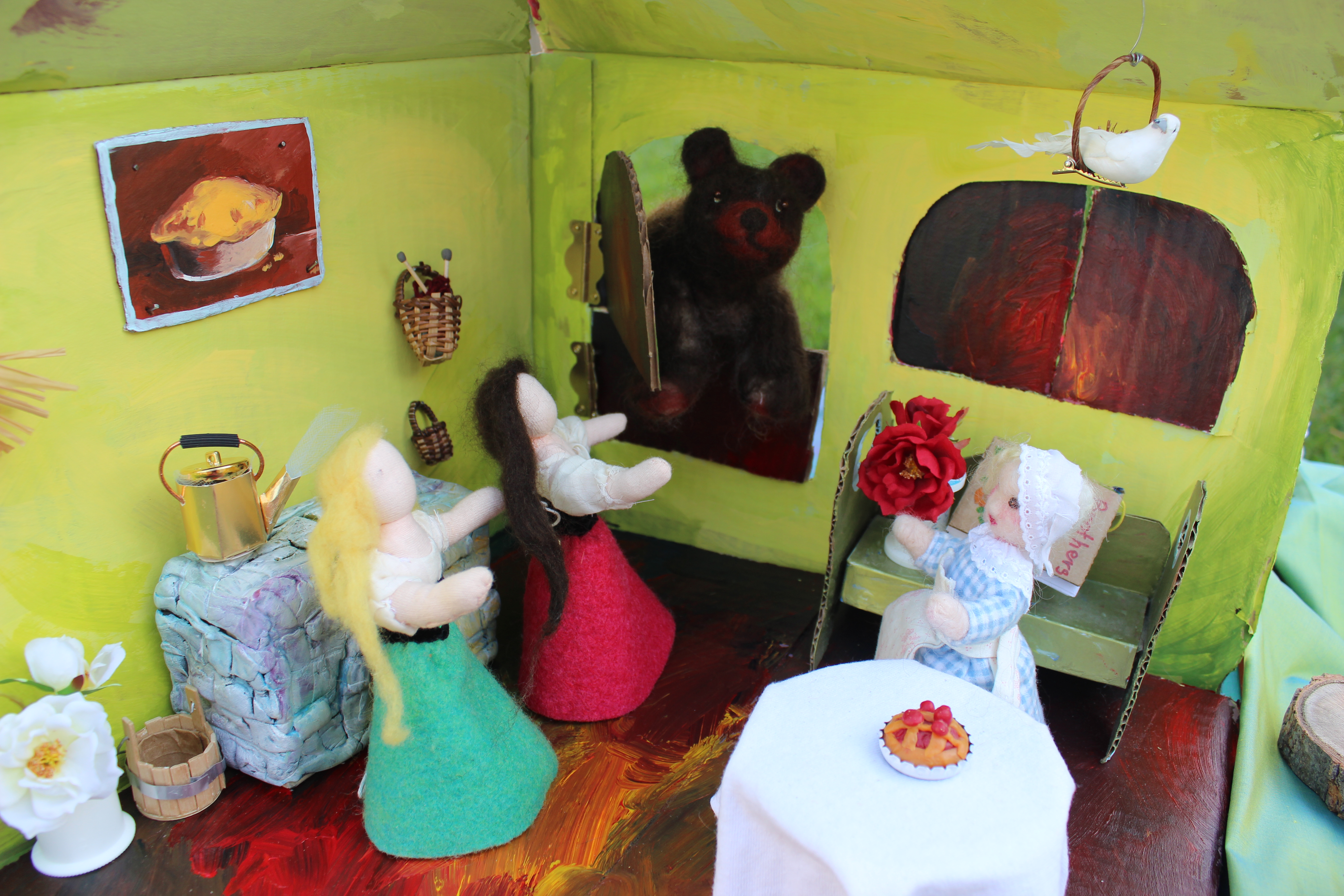
Homemade puppet show for Nunu’s 8th birthday (Click on photo to see the puppet show)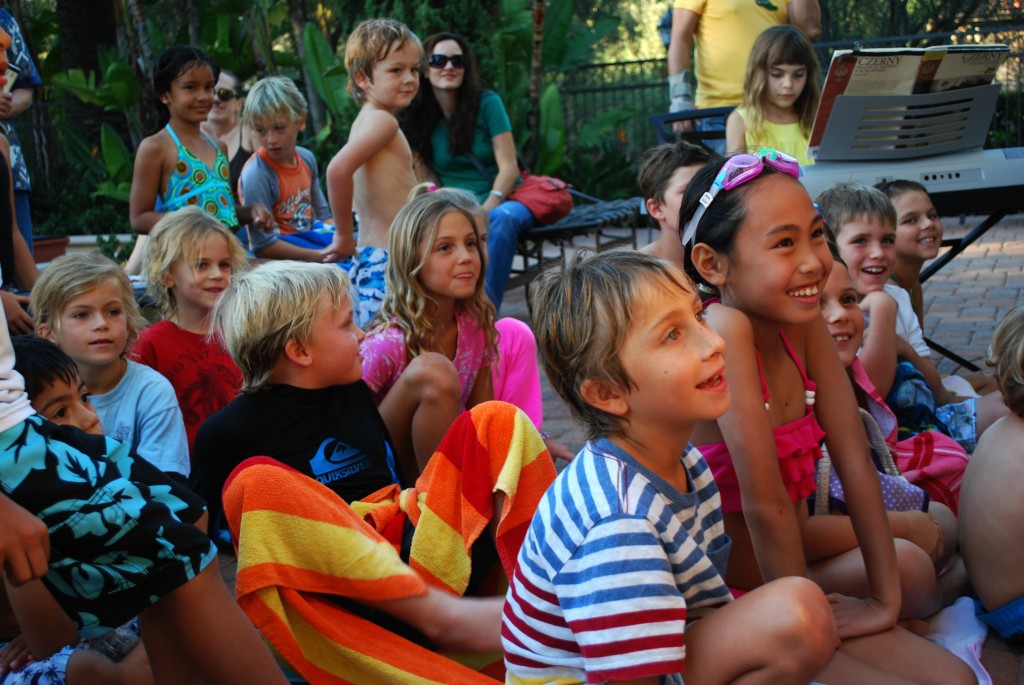
- I prefer to use forms of motivation for my child outside of piano practice. When she is at the piano, ideally we simply focus on the practice. However, some days are more laborious than others. I save these gimmicks as a last resort for a rainy day.
- Photo: Japanese stickers from Kinokuniya on a landscape
- flags of the world stickers for practicing “Old French Song”
- Building a joyful area around the piano
- Excuses for Celebrations!
- We celebrate small successes whenever the child overcomes some challenging steps
- Composer’s birthday celebrations. Nunu and her piano compadre Anichka celebrated Franz Liszt’s birthday in October 2011 with passerby’s on the beach. Photos pending.
- Using Special homeboy handshakes
- for those difficult practice pieces, we encourage each other with fun gangsta handshakes as we celebrate each tiny successes. My child loves to create her own “handshakes”
- (I chose handshakes over “cheerleader cheers” to emphasize on the “effort and collaboration” as a cause for success rather than “her innate personal excellence” as a cause. You can always strive to have more “effort and desire to try” but a child who thinks she has too much “innate excellence” will not have anything to work for. Too many cheerleader cheers can be problematic for her ego and desire to practice.)
- Excuses for Celebrations!
Owl metronome made in Frankfurt, Germany
- Our beloved owl metronome (lovingly named “William” the metronome) adds heart to the piano practice. Click here to see our other favorite literature and motivational aids.
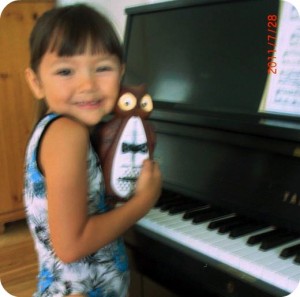

Beauty 美
- Dramatic scenarios
- Special piano pieces. My child currently loves some fun pieces…these pieces change as she grows and changes.
- Fur Elise by Beethoven
- La Tartane de Beurre by Leopold Mozart
- William Tell Overture by Rossini
- Pictures
- Legato followed by staccato: Ms Mary Anne says picture the whale jumping out of the ocean in an arc, then makes a clear splash into the water.
- Amy Chua provided many examples in her hilarious and inspiring landmark book “Battle Hymn of the Tiger Mom” Kudos, girlfriend, being vulnerable in your book for the benefit of little pianists everywhere!
- Stories
- Beethoven’s Moonlight Sonata. Good ol’ sappy story, always make me cry at the concert of this piece!
- The Schumans and their various dramas. Clara is always fascinating, being a woman pianist and mother (children love stories of musicians that involve other children or composers as children). And the romance.
- Shubert’s Trout
- The idea is: even you, little child, can tell a story without words, without puppets, without drawings but by music alone. This is like new magical wings for a pianist child who now has a new secret mode of communication.
A home with music is one of the treasures of being alive. Cancan scene from Nikita Mikhalkov’s Burnt by the Sun. Утомлённые солнцем. Why not using Can Can as a signal for family members to gather for lunch?
Thank you IgorAdmiral for uploading this on youtube.com. This is a shattering and beautiful film. If you want to watch more, click here: youtube.com and blessings to the guy who uploaded it.
Updates
Nunu (not her real name), age 6, played Symphony No. 1 by Gustav Mahler and Spring, by Antonio Vivaldi. This was Nunu’s first piano recital.
June 2011. Nunu (age 6) played Minuet in G by J.S. Bach at year end recital at Pacific Conservatory.
Age 6, Certificate of Merit Level 2, Golden Seal. J.S. Bach Prelude No. 3
Winter 2012 Piano Recital.
December 30, 2012. Nunu, aged 8, performed 2 piano pieces for her Winter 2012 Piano Recital: (1) La Styrienne by Friedrich Burgmüller (2) Little Waltz by Anatoly Liadov.
May 2013. Today Nunu (age 8) received her California Music Teachers Association Level 3 Certificate of Merit Test results back: She is pleased to get her Branch Honors Gold Medal sticker on her certificate! Hard work tastes so sweet! This is her second Branch Honors Gold seal. We have not used negative reinforcements on my beloved third child yet, and hope it will remain positive reinforcements all the way.
April ?, 2014. Nunu age 9 performed Slonimsky’s Thumbelina at MTAC Contemporary Music Festival piano competition.
September 2014. Age 9. Started learning Violin with Debora Wonderchek.
October 12, 2014. My heart is brimming with pride and joy, from watching my little one perform piano this evening. She played The Storm by Friedrich Burgmüller here. Bear with me, in the first few seconds the camera was unfocused
Age 10. April 19, 2015. Music Teacher’s Association of California 2015 Certificate of Merit Branch Honors Recital. Two Ladies Gossiping by Aram Khachaturian. Certificate of Merit Level 6. Golden Seal.
Please “Like” Castle of Costa Mesa on Facebook
If you liked this page, please “Like” us on facebook! Thanks! – Jzin


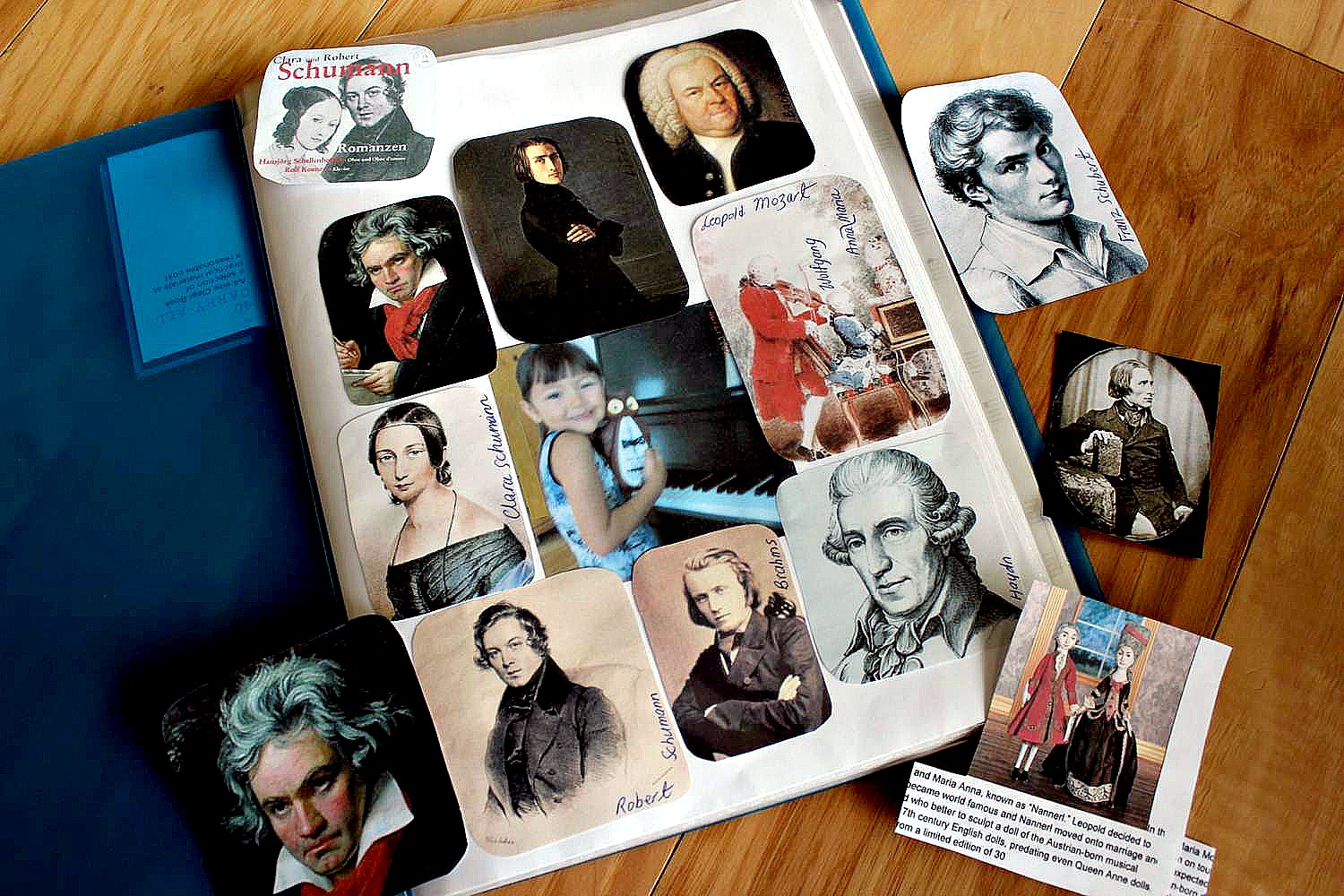
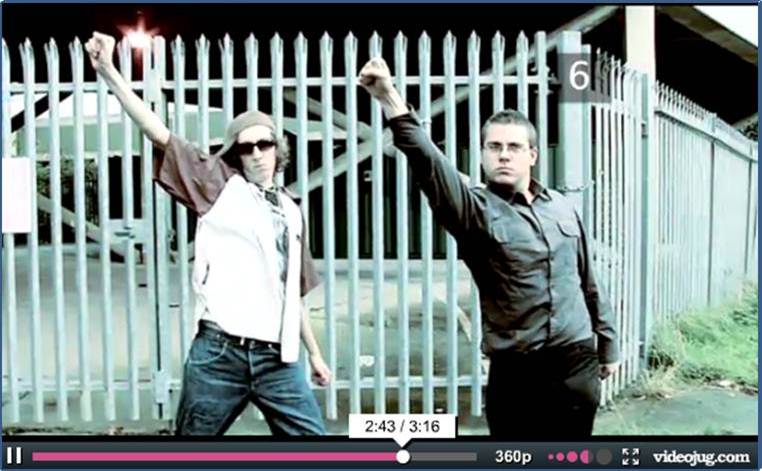

Marina
You have really interesting blog, keep up posting such informative posts!
Ethanael
We need a lot more insights like this!
jzinius
Thank you so much for your kind comment!
Happy Winter!
Jzin
CastleofCostaMesa.com
Roxanne
Wow, these are powerful ideas on how to keep your child motivated, thinking, happy and positive! Thank you for sharing.
Sine-Göz
Hi, i feel that i saw you visited my site so i got here to return the choose?.I’m trying to find things to enhance my web site!I assume its good enough to make use of a few of your ideas!!
Kelis
Grade A stuff!
Pavel Petrov
As a concert pianist, music teacher, collaborator and a student myself I would like to thank you for your truly wise and creative attitude towards motivation and dedication for young children.
Hard work and discipline together with healthy imagination and associative thinking, powered by support and care of loving parents and teachers – all of these valuable aspects will always create an unforgivable and colorful journey for our children to personal success and spiritual growth.
Beautiful work, ideas and thoughts – keep on creating!
Susie
I am inspired by your insights on motivating your daughter to play the piano. I remember dreading practicing piano as a child and now am so thankful for the skill to play piano. I will definitely be referring to this page for ideas when my girls learn piano. Thank you for sharing!
Sandra M.
This is the post I will come many times to re-read. Maybe it would be best to print it, lol! Thanks for all of your advices…